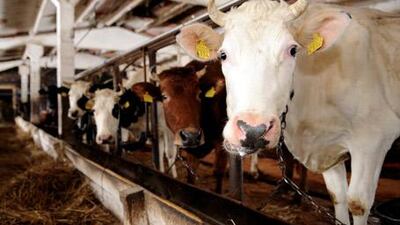A new book purports to explain 10,000 years of human history through mankind's evolving relationship with food. Matthew Price looks sceptically on the commodity fetish that dominates history writing today. An Edible History of Humanity Tom Standage Walker & Company Dh60 In defence of the vocation of history it is often said that we can only understand the present by reference to the past. But it is equally true that each present writes the past it prefers to read - and animates and reshapes it according to the ideas and beliefs of the present. The sweeping "world histories" that emerged in the early part of the 20th century - bulging multi-volume works like Arnold Toynbee's A Study of History and Will and Ariel Durant's The Story of Civilization - attempted to chart the lifespan of humanity through the rise and fall of civilisations and, in particular, to chronicle and explain the evolution and triumph of the West.
Today the rise and fall of civilisations no longer seems a pressing matter, and the broad canvas on which historians once painted has mostly fallen from favour. If the publishing industry is any barometer, the oft-mocked thesis of Francis Fukuyama's "end of history" - that "all of the really big questions had been settled" in favour of liberal capitalism - may be correct after all: every week, it seems, brings a new history of milk, or caffeine, or tobacco, or cotton. The secret to understanding history, it seems, no longer lies in the dialectic or class struggle, the idea of progress or the triumph of liberal democracy, but in our furniture (there's even a history of the bookshelf), the clothes we wear, or the food we eat.
If the present writes the past to reflect its own preoccupations, then it should be no surprise that the age of conspicuous consumption prefers the history of commodities to that of ideas and movements. Today it would seem naive to believe that an idea could change the world, but it's perfectly credible to assert that the potato did. Tom Standage's An Edible History of Humanity doesn't limit itself to a single starchy tuber, however - it's a world history for the food-obsessed, an update of Toynbee or Durant suited to an age when more people are more concerned with what they put in their mouths than at any time in human history.
Standage, the business editor of the Economist, who earlier produced a potable history of humanity called A History of the World in Six Glasses, here compresses 11,000 years of eating into a brisk 269-page tour d'horizon that adds up to a defence of its own conceit. If we are obsessed with food, according to Standage, we have every right to be: human history can - and must - be explained by the evolution of our relationship to food and its production. Human progress has marched hand-in-hand with developments in agriculture and food production; looking back, we can see that food itself has "acted as a catalyst of social transformation, societal organisation, geopolitical competition, industrial development, military conflict and economic expansion. From prehistory to the present, the stories of these transformations form a narrative that encompasses the whole of human history."
This is a recipe for an all-night banquet of historical ideas, but Standage gives us a modest morsel that won't you give you indigestion. His "ingredients of the past" can be summarised as follows. The advent of farming and agriculture transformed man from hunter-gatherer into sedentary farmer and made civilisation as we know it possible. Food surpluses and irrigation systems enabled political centralisation and social stratification. Trade in foodstuffs like spices connected civilisations - Arab, Christian, Asian - in a global trade network, which had profound historical consequences: the settlement of the Atlantic world, for example, was spurred by Europe's attempt to circumvent the Arab spice monopoly in the 15th and 16th centuries.
It turns out, of course, that the people who made history needed to eat while doing so, and Standage produces abundant examples to prove it. It was "sugar and potatoes", he writes, that enabled the Industrial Revolution in Britain, providing "cheap sustenance for the workers in the new factories". Armies were defeated and wars lost for lack of food supplies, millions murdered in famines under Stalin and Mao, and millions more sustained by the Green Revolution that transformed agriculture in the developing world.

